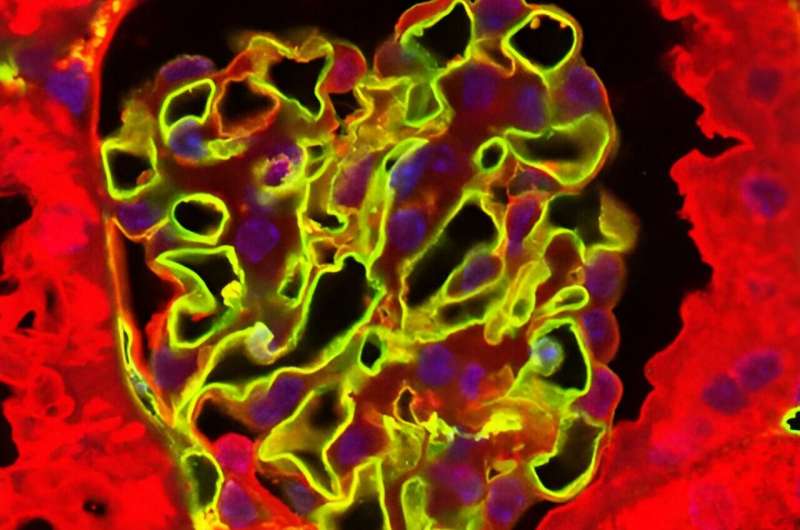This article has been reviewed according to Science X's editorial process and policies. Editors have highlighted the following attributes while ensuring the content's credibility:
fact-checked
peer-reviewed publication
trusted source
proofread
Study highlights potential new approach for early intervention for diabetic patients at risk of kidney disease

In new results published in Diabetes, researchers at the University of Bristol have uncovered a mechanism by which a hormone can protect the blood vessels in the kidneys from the damage caused by diabetes. In doing so, the team has identified a potential early treatment strategy to prevent or slow progression of kidney disease in people with diabetes.
Diabetes is the leading cause of kidney failure in the UK. One in five people with diabetes will need treatment for kidney disease during their lifetime and almost one in three people who need dialysis or a transplant have diabetes. As well as these treatments being incredibly grueling for patients, they come at a cost. It is estimated that in 2023, the direct cost to the NHS of dialysis and kidney transplant surgery with follow-up care was £1.05 billion (not including the £225 million spent on transport for patients on in-center dialysis) and £293 million, respectively.
Kidney damage from diabetes usually happens slowly over many years. One of the ways damage can be caused is by disruption of the glycocalyx—a thin gel-like layer lining the surface of the blood vessels forming part of the tiny filters of the kidney ('glomeruli')—due to high blood sugar levels over a long period of time. This layer plays a crucial role in kidney function; it has a barrier function, preventing larger molecules like proteins from leaving the body in the urine. One of the first signs of kidney disease in patients with diabetes is the presence of a protein called albumin in the urine.
Adiponectin, a hormone produced by fat cells in the body, plays a protective role: helping the body use sugar more efficiently, reducing inflammation and preventing blood vessel damage. Previous studies have shown that adiponectin levels are lower in people with diabetes and that adiponectin can prevent signs of kidney damage, such as preventing albumin from being lost in the urine in laboratory models of diabetic kidney disease (DKD).
Using several laboratory-based models of DKD, the team were able to show that adiponectin both reduced glycocalyx damage, and restored its depth, which reduced the leakiness of the vessels.
Dr. Rebecca Foster, Associate Professor of Microvascular Medicine at Bristol Medical School and senior author of the study, explains, "We knew that adiponectin was protective, but we wanted to understand whether it might be acting by supporting the barrier function of the blood vessels to stop them from becoming leaky. We were really excited because it's the first time that this fat hormone has been shown to play a role in glycocalyx health. It's a new mechanism of action."
As damage to the glycocalyx happens early on in diabetes, these new findings suggest that targeting the adiponectin signaling pathway could help to protect this layer in people with diabetes, potentially preventing them from DKD.
Dr. Aisling McMahon, Executive director of research and policy at Kidney Research UK said, "Preventing people with diabetes from developing serious kidney problems is a key priority for Kidney Research UK, both to spare as many people as possible from having to endure the treatments associated with advanced kidney disease, and to reduce the financial impact of kidney disease on the NHS.
"These findings suggest that targeting the adiponectin pathway might provide a completely new approach to preventing diabetic kidney disease. Further research in this area could lead towards the development of a new preventative treatment for this at-risk group."
More information: Paper: Adiponectin in the maintenance and protection of glomerular endothelial cells and the glycocalyx in diabetes.




















